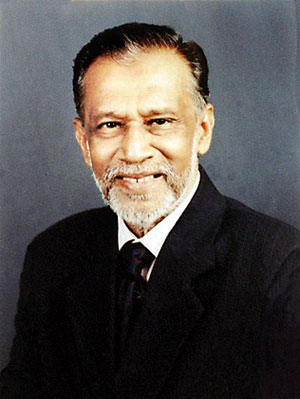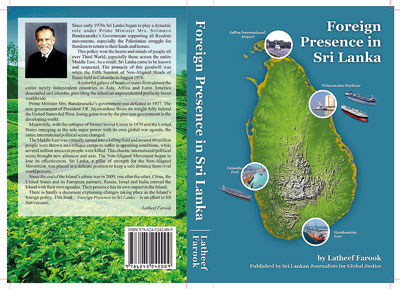Sunday Times 2
Foreign presence in Sri Lanka and its inevitable impact
View(s):The book, Foreign Presence in Sri Lanka by veteran journalist Latheef Farook, is about the presence of rival foreign powers and their inevitable impact on the country known for its independent foreign policy with which it won the hearts of the entire Third World.
It was this policy which made the island host the Fifth Summit of the Non-Aligned Movement in 1976. It was attended by a galaxy of leaders from Asia, Africa and Latin America.

Author Latheef Farook
However, the short-sighted policies of successive governments gave birth to almost three decades of devastating ethnic war and brought in all sorts of players, eroding the island’s sovereignty. This trend continued even after the ethnic war ended in 2009.
China was the first to enter with its multi-billion-dollar projects.
Israel, expelled time and again, entered the island like a midnight thief, and began penetrating Sri Lanka’s politics, media and numerous other fields with its global anti-Muslim agenda.
In the midst, the global rivalry in the Indian Ocean brought in the United States, Europe and India. This needs to be viewed in the context of the growing rivalry between China and the Washington-London-New Delhi axis which has now absorbed Saudi Arabia and Abu Dhabi.
The result was the island becoming a playground for rival powers, facilitated by the country’s corrupt governments.
For example, as stated by columnist Rajeewa Jayaweera in The Island, “Less than 72 hours after Gotabaya Rajapaksa took oaths as the seventh Executive President of Sri Lanka, an unannounced and uninvited visitor, Indian Foreign Minister S Jaishankar landed in Colombo as Prime Minister Narendra Modi’s special envoy, with an invitation for the Sri Lankan President to visit India on November 26. Mr Jaishankar reportedly conveyed India’s expectations to President Gotabaya.”
 Addressing the media jointly in New Delhi following closed-door bilateral talks during which only an Indian translator, no Sri Lankan note-taker, was present, Mr Modi said: President Rajapaksa told me about his inclusive political outlook on ethnic harmony. I am confident that Sri Lanka will carry forward the process of reconciliation, to fulfil the aspirations of the Tamils for equality, justice, peace and respect. It also includes the implementation of the 13th Amendment, but, nothing was mentioned about the island’s Muslim community.
Addressing the media jointly in New Delhi following closed-door bilateral talks during which only an Indian translator, no Sri Lankan note-taker, was present, Mr Modi said: President Rajapaksa told me about his inclusive political outlook on ethnic harmony. I am confident that Sri Lanka will carry forward the process of reconciliation, to fulfil the aspirations of the Tamils for equality, justice, peace and respect. It also includes the implementation of the 13th Amendment, but, nothing was mentioned about the island’s Muslim community.
India offered a US$ 400m credit line and a further US$ 50m to combat terrorism. The question is what to combat when there is no terrorism in the island. The only terrorism was the organised attacks on unarmed Muslims.
Narendra Modi is no angel of peace. He was accused of committing genocide on Guajarati Muslims in February 2002 when he was the state Chief Minister. He was declared persona non grata by most countries, including the US. The irony is that this very same Modi is Prime Minister of India and he speaks about terrorism.
In another development, days after President Gotabaya said he wanted to renegotiate the agreement on Hambantota port, China dispatched a high-level team perhaps to inform, that renegotiation was out of the question. In its wake, US, Japanese and Russian high-level visitors arrived in Colombo and met President Rajapaksa with messages from their countries’ leaders.
Also visiting Sri Lanka at the same time was Chinese Foreign Affairs Minister Wang Yi. He declared in Colombo that “China won’t allow any outside influences to interfere with matters that are essentially internal concerns of Sri Lanka. China would continue to stand by Sri Lanka’s interests as a strategic partner and for Sri Lanka’s sovereignty, territorial integrity and independence”. Such a statement in the capital of Sri Lanka was shocking. However, there was no response from any one.
It is in these contexts that one needs to view the Easter Sunday bombings, senseless killing in churches and hotels on April 21 2019 and the vicious campaign which demonised the entire Muslim community and vilified their religion — Islam.
Some government ministers and Cardinal Malcolm Ranjith, whose timely interference prevented a blood bath, repeatedly stated that the Muslim community had nothing to do with the carnage and have accused foreign forces of involvement. However, to date the former Maithripala Sirisena-Ranil Wickremesinghe government, which failed to prevent this carnage, have refused to disclose the foreign forces involved.
It is common knowledge that Israel and India have got together with the United States and Europe to corner the entire Middle East and bring South Asia under their influence. The country’s mercenary media refuse to discuss these issues.
There is hardly a document dealing with the involvement of foreign forces here. Foreign Presence in Sri Lanka is an effort to fill this vacuum.

